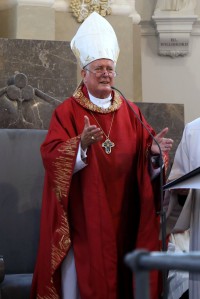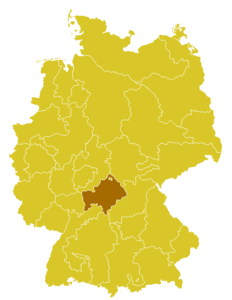 As announced by the Nuncio yesterday, the retirement of Bishop Friedhelm Hofmann will begin today. The bishop of Würzburg, who celebrated his 75th birthday in May, has been at the helm of the diocese for 13 years.
As announced by the Nuncio yesterday, the retirement of Bishop Friedhelm Hofmann will begin today. The bishop of Würzburg, who celebrated his 75th birthday in May, has been at the helm of the diocese for 13 years.
The announcement of the upcoming retirement was made on Sunday when the bishop and diocese celebrated the 25th anniversary of his ordination as a bishop. Before coming to Würzburg in 2004, Bishop Hofmann served as an auxiliary bishop of Cologne for 12 years.
The silver jubilee of his ordination as bishop was thus also an opportunity to thank Msgr. Hofmann for his service. Numerous bishops from Germany and abroad had come to concelebrate, among them Cardinals Reinhard Marx and Friedrich Wetter, from Munich both, Archbishop Piero Marini, and Archbishop Jean-Claude Périsset, the previous nuncio to Germany, Archbishop Jean-Claude Hollerich from Luxembourg, Bishop John Ndimbo from Mbinga in Tanzania and Bishop Bernardo Johannes Bahlmann from Óbidos in Brazil, both partner dioceses of Würzburg.
In contrast with the expressions of appreciation and gratitude for his work, from brother bishops as well as the local Lutheran bishop and the president of the Bavarian parliament, Bishop Hofmann rather more critical in his homily. Looking back on the past 25 years, he noted how the problems in society had not improved. “On the contrary, the problems became more acute and new challenges have arisen”. Examples mentioned by the bishop were the cries in the world leading to increasing streams of refugees, the increase in religiously motivated extremism, and the ethical challenges of genetic research. How can this be compatible with God’s love for us? Referring to his motto, “Ave crux, spes unica“, Bishop Hofmann said, “What may seem to us as the ultimate humiliation, is for Jesus the rising and entrance into the glory of the Father. This belief shakes us up and presupposes knowledge of the fullness of our salvation.”
In a recent interview for the Tagespost, Bishop Hofmann looked ahead to his retirement, saying:
“I am aware that I am taking a step back. I will not interfere in how my successor executes his office. I have decided that for myself. My predecessor, Bishop Scheele, did the same thing. But I am willing to help out when I am asked, for examples with confirmations. I will continue living in Würzburg.”
Said interview also contains a number of comments from Bishop Hofmann on a number of topics, comments which show that, in many respects, this is a bishop with his head screwed on right.
On same-sex marriage, promoted in Germany by the “Ehe für alle” (marriage for all) initiative, he says:
“The so-called “Ehe für alle” is, in my opinion, a catastrophe for society. Marriage is a God-willed union of man and woman, which is open to the generation of new life. An “Ehe für alle” is therefore impossible according to Catholic understanding. Pointing this out is not remotely the same as attacking or discriminating homosexual people”.\
About the presence of Muslim immigrants (and often second- and third-generation Muslims) in German society, which in the basis remains a Christian society:
“It should be clear: when Muslims come to us and want to live here, they must accept our social rules. But for me as a Christian, the Islam is not a challenge. It is rather the failing of Christianity that we should fear. We must speak with Muslims on equal footing. We must make it clear to them that basic civilian advances such as the Charter of the United Nations of the Basic Law of Germany are based on Christian ethics. We must inform them that their freedom and wellbeing also depend on the continued existence of that Christian foundation.”
The shortage of priests is also felt in Würzburg. The number of young men knocking on seminary doors is small. Bishop Hofmann points out several reasons for this.
“These days, young men often no longer come from a Christian family. When God is not mentioned at home, when there is no prayer, it is difficult to arrive at the thought to go this path. Secondly, young people have a fear of commitment. This can also be seen with marriage. People no longer want to commit themselves to one person for their entire lives. That obviously makes celibacy a major hurdle, which many cannot overcome, although they may certainly be suitable for the priesthood. And then there is the great pressure of expectation on the priest from the community. Many priests experience this. Young people then wonder if they want to do that to themselves.”
Another hot-button topic is the question of ordaining women to the priesthood. Bishop Hofmann has something to say about that, and about celibacy and the ordination of married men, too.
“The ordination of women is not possible. The priest, after all, represents Christ and must therefore be a man. The Church has no leeway there. This is a different question than that of celibacy. I consider celibacy to be a very important concept. In it, the Church makes clear that she is not a great worldly concern, but is built on a different foundation. But there have always been married priests as well in our Church, for example in the Uniate churches or converts. It is therefore possible to discuss the question of the viri probati. But this discussion should not be held in such a way that one speaks ill of celibacy and considers it superfluous. It can only be about ordaining proven men, for example deacons, who have shown themselves capable of ecclesiastical service as married men. Such a step can only be made in unity with the word Church. The pope is certainly open to thinking in this direction, but at the same time he is not one who wants to rip the Church from her foundations.”
The Church in Germany is among the richest in the world. In the past, Pope Benedict XVI, himself a German, has been very critical about the wealth of the Church. Bishop Hofmann says:
“Pope Benedict was completely right. In Germany, we are a rich Church. But in the face of the needs of the world I often wonder myself if all the reserves that we are building are justified, or if we shouldn’t give that money to the poor and hungry.”
Finally, Bishop Hofmann greatly respects the retired pope, and the way that he is sometimes discussed is a discgrace.
“Pope Benedict is one of the greatest theologians to have occupied the seat of Peter. He has given the world so much that is positive and important, in word and deed. It is a tragedy that we haven’t always positively accepted this in Germany. But I am convinced that in 20, 30 years Pope Benedict will find new listeners as a Doctor of the Church of the modern age.”
 Würzburg is the second diocese, after Hildesheim, to fall vacant after a brief spell in which every German diocese had a bishop at its head. When the retirement of Bishop Hofmann begins, at noon today, auxiliary bishop Ulrich Boom will be in charge until the cathedral chapter has chosen an administrator to oversee current affairs until a new bishop has been appointed. Würzburg is the northernmost diocese in Bavaria and a part of the Church province of Bamberg.
Würzburg is the second diocese, after Hildesheim, to fall vacant after a brief spell in which every German diocese had a bishop at its head. When the retirement of Bishop Hofmann begins, at noon today, auxiliary bishop Ulrich Boom will be in charge until the cathedral chapter has chosen an administrator to oversee current affairs until a new bishop has been appointed. Würzburg is the northernmost diocese in Bavaria and a part of the Church province of Bamberg.
Photo credit: Markus Hauck (POW)